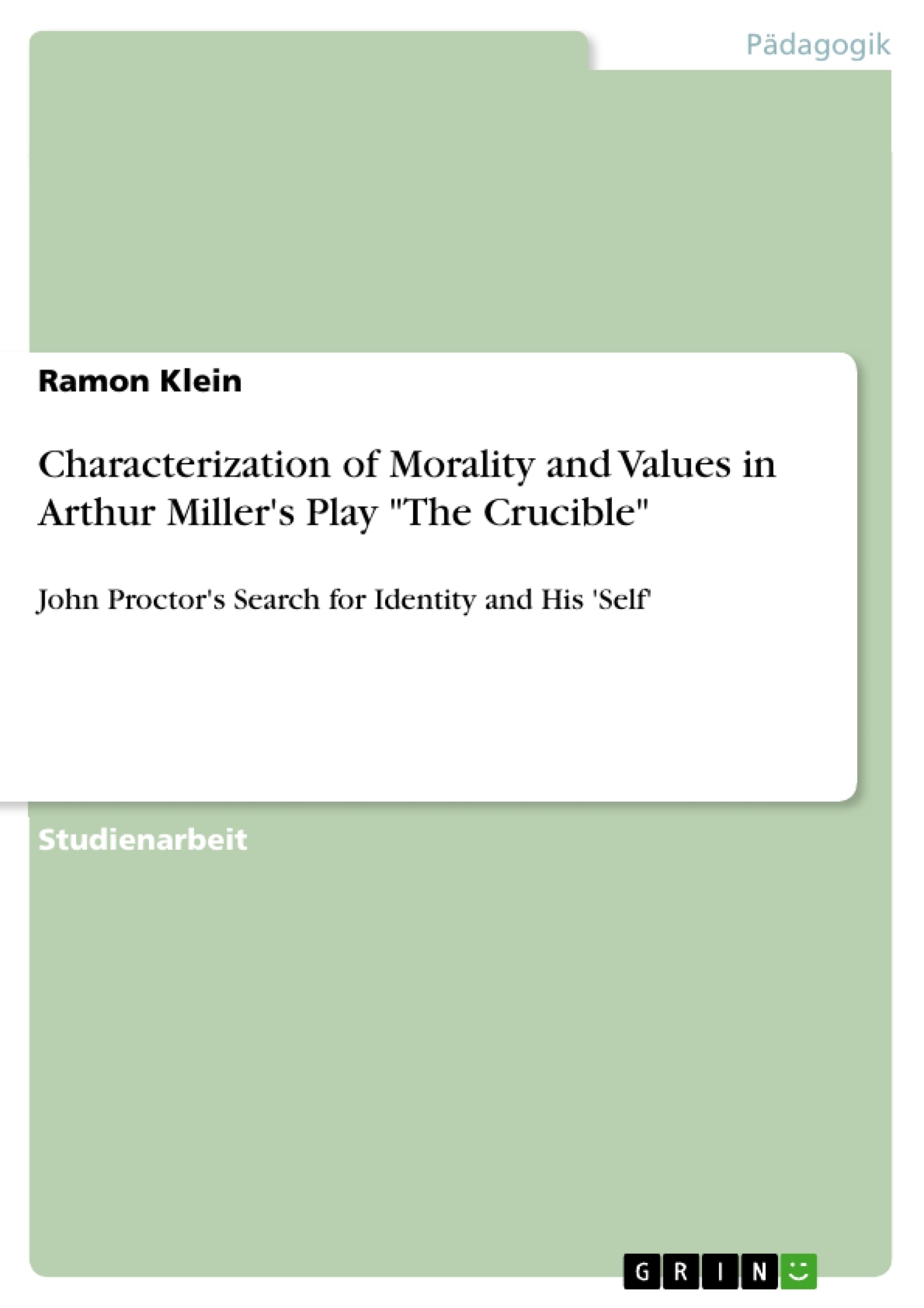In The Crucible (1953), a four-act play, Miller's scene is Salem, Massachusetts in the year 1692 ad the action is based on the witchcraft trials of that time. In “A Note on the Historical Accuracy of This Play,” Miller says: “This play is not history in the sense […] used by the academic historian,” for “dramatic purposes” prompted certain changes in the record. Nevertheless, Miller believes the “reader will discover here the essential nature” of the Salem trials (Miller, in: Murray: 1967, p. 52).
This quote describes the truth in an appropriate short way. The following analysis of the main characters has not the aim to offer the reader a n adequate historical overview, nor to work as an outline to present the details of the people who lived in Salem in 1692. The aim is in fact to characterize and interpret the protagonists, as Miller did it in his day, and through this, to expose the development of their sense of morality and their pursuit of freedom, especially of John Proctor. To reach that aim the focus will be on John Proctors internal state of mind concerning his contradictory behavior. This means his strengthening of his will and his conviction of what is wrong and right. The reader will find a development of his comprehension of his 'self' among emotional alterations, which matters a lot in Miller's dramas, as much as social behavior and religious crises. Those crises start a chain of events, which do most notably peak in Proctor's quest for identity and the dramatic finding of it.
Through information given in the dialogues in Miller's play The Crucible will the reader be told about the answers to the question, what the influences were that the main characters had on John Proctor. After the analysis of the protagonists a special analysis of John Proctor takes place which has the aim to describe his search for identity and resume and evaluate it in a conclusion in the end. Due to the mentioned focus on the finding of Proctor's 'self' there will be no explicit study of historical backgrounds of the Salem witchcraft trials per se. And due to the lack of space in this study will there be no further analysis of further plays of Miller or his way of narrating plays in general. The the text will shortly be about characterizations of the main roles in Arthur Miller's The Crucible, with focus on John Proctor's view of morality and his 'self'. And a conclusion. As Bigsby (2005: p. 158) said before: “The Crucible is both an intense psychological [...].
Inhaltsverzeichnis
- Introduction
- Characterizations
- Reverend Samuel Parris
- Abigail Williams
- Elizabeth Proctor
- Deputy-Governor Danforth
- John Proctor as the Protagonist
- John Procor's Search for His 'Self'
Zielsetzung und Themenschwerpunkte
Diese Analyse von Arthur Millers Stück "The Crucible" befasst sich mit der Darstellung von Moral und Werten in der Geschichte der Hexenprozesse in Salem, Massachusetts im Jahr 1692. Der Fokus liegt dabei auf der Interpretation der Protagonisten und ihrer Entwicklung in Bezug auf Moral und Freiheitssuche. Insbesondere wird die Suche nach der eigenen Identität durch John Proctor im Mittelpunkt stehen.
- Darstellung der moralischen und wertorientierten Entwicklung von John Proctor
- Analyse der Charaktere und ihrer Einflüsse auf John Proctor
- Die Rolle von religiösem Druck und sozialem Verhalten in den Hexenprozessen
- Die Suche nach der eigenen Identität im Angesicht gesellschaftlicher und persönlicher Konflikte
- Die Bedeutung des Selbstverständnisses in der Auseinandersetzung mit moralischen und religiösen Dilemmata
Zusammenfassung der Kapitel
Die Einleitung führt in die Thematik der Hexenprozesse in Salem ein und erläutert den Ansatz der Analyse. Der Schwerpunkt liegt auf der Charakterisierung der Protagonisten, insbesondere John Proctor, und dessen Suche nach der eigenen Identität.
Das Kapitel über "Characterizations" bietet eine detaillierte Analyse der wichtigsten Figuren des Stückes, wie Reverend Samuel Parris, Abigail Williams, Elizabeth Proctor und Deputy-Governor Danforth. Der Fokus liegt dabei auf deren Charakterzüge, Motivationen und Einfluss auf John Proctor.
Im Kapitel über "John Proctor as the Protagonist" wird die Rolle des Protagonisten in der Geschichte der Hexenprozesse beleuchtet. Besonders wird die innere Zerrissenheit und die Suche nach der eigenen Identität durch John Proctor beleuchtet.
Der Fokus liegt auf der Entwicklung seiner moralischen Werte und seiner Auseinandersetzung mit den Widersprüchen zwischen seiner inneren Überzeugung und den gesellschaftlichen Erwartungen.
Schlüsselwörter
Die Schlüsselwörter dieser Arbeit sind "The Crucible", "Arthur Miller", "Hexenprozesse", "Salem", "Moral", "Werte", "Identität", "John Proctor", "Freiheitssuche", "gesellschaftlicher Druck", "religiöse Krise", "Selbstverständnis", "Charakterisierung", "Protagonist" und "psychologisches Drama".
Häufig gestellte Fragen
Worum geht es in Arthur Millers Stück „The Crucible“?
Das Stück behandelt die historischen Hexenprozesse von Salem im Jahr 1692 und nutzt diese als Parabel auf gesellschaftliche Massenhysterie und moralische Dilemmata.
Was ist der zentrale Konflikt von John Proctor?
John Proctor kämpft mit seiner inneren Moral, seiner Suche nach Identität und dem Widerspruch zwischen seinem fehlerhaften Verhalten und seinem Wunsch nach persönlicher Freiheit.
Welche Rolle spielt Abigail Williams in der Geschichte?
Abigail Williams ist die treibende Kraft hinter den Anschuldigungen und beeinflusst durch ihre Manipulationen massiv die moralische Krise in Salem.
Wie wird das Thema „Identität“ im Stück behandelt?
Die Arbeit analysiert, wie Proctor am Ende seine Identität findet, indem er sich weigert, seine Integrität für sein Leben zu opfern (Quest for Identity).
Ist das Stück historisch absolut präzise?
Nein, Miller selbst gibt an, dass er aus dramatischen Gründen Änderungen an den historischen Fakten vorgenommen hat, um die „essenzielle Natur“ der Ereignisse darzustellen.
- Quote paper
- Bachelor of Arts Ramon Klein (Author), 2013, Characterization of Morality and Values in Arthur Miller's Play "The Crucible", Munich, GRIN Verlag, https://www.grin.com/document/272347



